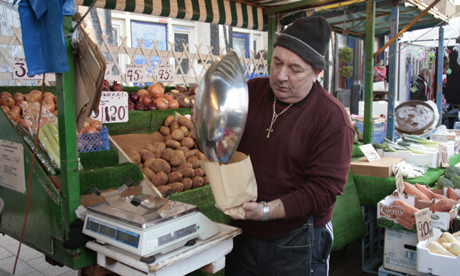Broadway goes up market
Film by Anna Davies and Richard Ridout
Broadway Market, after being abandoned throughout the ’90s, was subject to a renaissance in 2004. It continues to take place every Saturday and is hailed, by some, as a ‘trendy farmers’ market’.
However, there are local residents who feel they are excluded by the market’s price range – whilst others view it as an alfresco supermarket that caters for their weekly needs.
With the 2012 Olympics looming, signs of East London’s planned regeneration are becoming ever more prevalent.
Derelict buildings are being demolished with high-rise apartment-cum-shopping complexes being built in their place – such as the Dalston Square development up the road.
With a seemingly inevitable rise in rent and property prices, residents have concerns over the future of the area.
Parts of the borough are becoming gentrified, and perhaps the price range of the products on Broadway Market is an indicator of the rises that we can expect to arrive with the Olympics.
Hackney is home to a handful of long-running markets – such as Ridley Road Market in Dalston, which sells mainly fruit, vegetables, fish and meat. It’s very affordable, and caters for a mixed crowd.
Broadway Market manager, James O Nuanain, 32, compares Broadway Market to Ridley Road Market: ‘I think it’s more like Ridley than any other market [in Hackney], but a little bit posher, so it doesn’t compete with Ridley. It’s a little bit more expensive but a similar sort of thing – you’ve got clothes and you’ve got food.”
When asked if local people use the market, O Nuanain says, “Well – locally living people … we’ve got cheap fruit and veg, and there are plenty of deals on the market but it is perceived as the Marks and Spencers…”
“Rather than Morrisons,”says Alistair Maddox, 23, O Nuanain’s assistant.
“In many ways we would rather do a Ridley Road here but if we were doing a Ridley Road thing here then all the people round here that use Ridley Road or Chapel Market would be coming here instead so it would hit those markets, ” says O Nuanain.
They do, however, reap the benefits of the inexpensive Ridley Road Market. Maddox says, “We did the whole Broadway Market Christmas party shop on Ridley Road,”O Nuanain laughs, “It’s cheap”.
Louise Brewood, ex-chair of Broadway Market Traders Association, says she left the association a year and a half ago following a difference in opinion. “I wanted to bring in really good food, farmers’ food, which six years ago was seen as snotty, upmarket, well – actually no, it’s just really good local food.”
She feels the cost of the produce on Broadway Market was justifiable when she was still involved in the market: “At the time I could justify why you paid £5.00 for a loaf of bread and I could actually justify why you weren’t being ripped off”.
She felt it was important for people who had a ‘very small income’ to walk through the market and not feel that they were ‘pushed aside’ when they saw what was available on the stalls.
Brewood would reassure customers: “You are paying £5.00 for that loaf of bread because it’s made of this type of flour, it’s done this way. That cheese has done such and such, that’s why it’s going to cost you £3.00 but I can always balance that out by giving you something of reasonable quality at a different rate, from very low income to very high”.
A local resident, who did not wish to be named, feels differently about the cost of the products on sale at the market. She says, “It was nowhere near as expensive before as it is now. You say that to a woman what’s got about three kids, a single parent – £3.00 for a loaf of bread from a stall.”
Concerned about the impact tourism will have on the area, Brewood says, “I mean Percy Ingles is a perfectly good run of the mill baker; most of us use it on a regular basis. Broadway was about balancing the elements of resident, market trader and shop keeper and I think now the focus is just the market and the income it can bring.”

Greengrocer on his stall, Broadway Market Photo: © The Hackney Citizen Ltd
